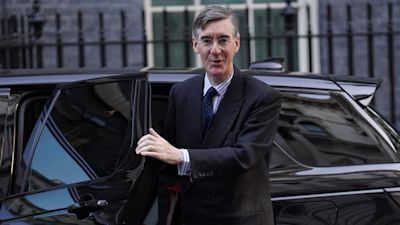'Other sources of information': Jacob Rees-Mogg suggests government can ignore OBR's warnings

Jacob Rees-Mogg has hit out at the Office for Budget Responsibility (OBR), suggesting the government can ignore its forecasts which predict low growth and rising debt for the UK.
The business secretary also criticised the International Monetary Fund (IMF) during a wide-ranging interview on ITV's Peston.
Mr Rees-Mogg said the OBR's record of forecasting accurately "hasn't been enormously good" adding it is not the "only organisation that is able to give forecasts".
Mr Rees-Mogg questioned the accuracy of the OBR's economic forecasts
"The job of chancellors is to make decisions in the round rather than to assume that there is any individual forecaster who will hit the nail on the head," he added.
"There are other sources of information."
ITV News Political Editor Robert Peston said he doesn't believe the business secretary's remarks are "remotely going to re-assure investors".
"The fact that Jacob Rees-Mogg is basically saying 'oh well, the chancellor is going to do what he likes' I think will be deeply disturbing to people," he said.
"And I have to say, I think there's a big risk that those market interest rates will rise further, putting more pressure on everybody's finances."
Meanwhile, the director of the Institute for Fiscal Studies think tank, Paul Johnson, also rejected the business secretary's suggestion that the chancellor can ignore forecasts from the OBR.
Robert Peston analyses the business secretary's responses to warnings from both the OBR and IMF
He told ITV’s Peston: “Of course they matter. It’s really important for, again, credibility which has become so important over the last few weeks, that we have these official forecasts and the chancellor responds to that by saying: ‘This is how I see my fiscal policy’.”
The economist also pointed out that the OBR forecasts have historically been over-optimistic.
“I mean, of course, he’s [Mr Rees-Mogg] right, forecasts are always wrong," he added.
"Actually, the OBR has historically been over-optimistic consistently on the economy. The economy has actually done worse than the OBR has suggested”.
On Tuesday, the IMF warned that while the UK economy could grow in the short-term it might also sharply retract as consumer spending catches up with surging inflation and higher interest rates.
Its forecast was prepared before Chancellor Kwasi Kwarteng unveiled his mini-budget, which set out sweeping tax cuts, including on stamp duty and income tax.
'I'm afraid I would never lose too much sleep about the IMF'
Asked about calls from the IMF for the UK’s economic support package to be more targeted, and for fiscal policy to be tightened in general, Mr Rees-Mogg issued a scathing analysis of the international body.
He said: "I think the IMF is wrong on both counts. I think it's particularly wrong on energy, and frankly, doesn't know what it's talking about.
"Because the price signal via the increases that are already happening, that have already come in with the £2,500 average usage cap are very strong to discourage wasteful usage of energy, so that just doesn't make any sense.
"If you think the cap was £1,100, it has gone to £2,500 with the ameliorations but before the £400 that people get and so on - that's a really strong buy signal to people.
"So, the IMF is not holy writ and the IMF likes having a pop of the UK for its own particular reasons.
"I'm afraid I would never lose too much sleep about the IMF."
Elsewhere, the business secretary suggested that the recent increase on UK bond and currency markets was created by actions from the Bank of England's (BoE) as opposed to the announcement of the mini-budget itself.
He blamed the Bank's decision to swell interest rates more slowly than the US Federal Reserve, saying: "It's to do with the increasing differential between UK interest rates and US interest rates. And that happened before the chancellor stood up to speak. That is what really determines currency movements - differentials in interest rate.”
Want a quick and expert briefing on the biggest news stories? Listen to our latest podcasts to find out What You Need To Know...